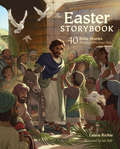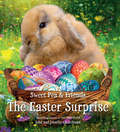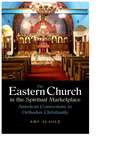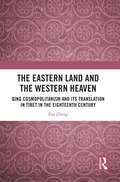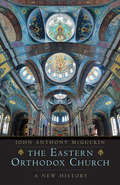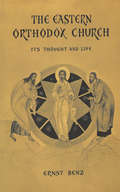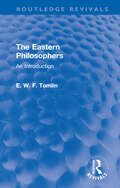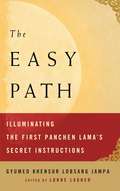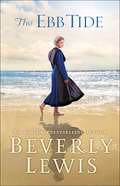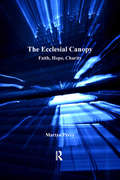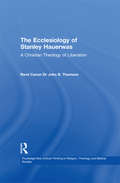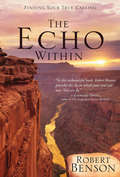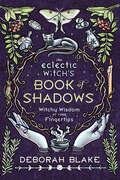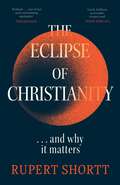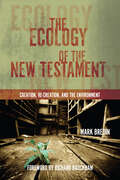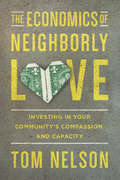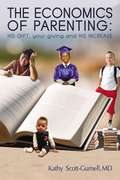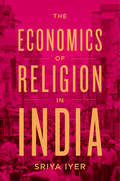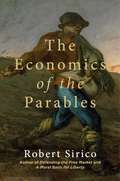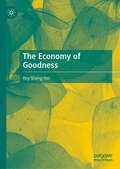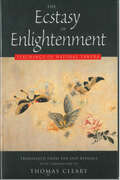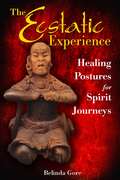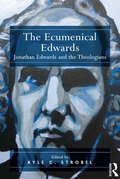- Table View
- List View
The Easter Storybook: 40 Bible Stories Showing Who Jesus Is
by Laura RichieStarting with Jesus&’ time in the temple as a boy and ending with His appearances after the resurrection, The Easter Storybook invites readers into the big picture of God&’s love. Each of the 40 full-color, beautifully illustrated stories includes a Bible passage and a conversational question to guide families through the Easter season together. Unlike other children&’s Easter books, The Easter Storybook focuses not just on Jesus&’ last days but on the journey of His whole life leading to the joy of Easter morning. Every story will give children a glimpse into Jesus&’ identity—as Teacher, Good Shepherd, Savior, and King—making this a rich book to read throughout the year.The Easter Storybook explains who Jesus is, what He did, and why His death and resurrection matter, in a simple way that children ages 4–8 can understand and remember. As a fitting companion to the bestselling The Advent Storybook, this book is a wonderful way to discover as a family why Jesus came to earth as Rescuer, Redeemer, and Friend.
The Easter Surprise (Sweet Pea & Friends #5)
by John Churchman Jennifer ChurchmanThe fifth book by the authors of the media sensation and instant New York Times bestseller The SheepOver, featuring a curious bunny and her baby farm animal friends solving an Easter mystery together. Fern the bunny wakes up one morning to a surprise: the squirrels have discovered a beautifully decorated egg in their tree! And it's not just the squirrels--Mo the kitten, the goslings, the puppies, and even the lambs have all found special eggs hidden around the farm. As the baby animals follow clues from one egg to the next, Fern thinks she sees two soft, pointy ears peeking out above the grass. Then she notices a fluffy tail disappearing behind the barn. Then she spots long whiskers twitching among the flowers! Someone is watching, and the animal friends will have to solve their Easter mystery together to find out who. With vividly evocative photo illustrations, John and Jennifer Churchman bring to life a delightful story based on real animals and events on their Vermont farm.
The Eastern Church in the Spiritual Marketplace: American Conversions to Orthodox Christianity (NIU Series in Orthodox Christian Studies)
by Amy SlagleLike many Americans, the Eastern Orthodox converts in this study are participants in what scholars today refer to as the \u201cspiritual marketplace\u201d or quest culture of expanding religious diversity and individual choice- making that marks the post-World War II American religious landscape. In this highly readable ethnographic study, Slagle explores the ways in which converts, clerics, and lifelong church members use marketplace metaphors in describing and enacting their religious lives. Slagle conducted participant observation and formal semi-structured interviews in Orthodox churches in Pittsburgh, Pennsylvania, and Jackson, Mississippi. Known among Orthodox Christians as the \u201cHoly Land\u201d of North American Orthodoxy, Pittsburgh offers an important context for exploring the interplay of Orthodox Christianity with the mainstreams of American religious life. SlagleÆs second round of research in Jackson sheds light on the American Bible Belt where over the past thirty years the Orthodox Church in America has marshaled significant resources to build mission parishes. Relatively few ethnographic studies have examined Eastern Orthodox Christianity in the United States, and SlagleÆs book fills a significant gap. This lucidly written book is an ideal selection for courses in the sociology and anthropology of religion, contemporary Christianity, and religious change. Scholars of Orthodox Christianity, as well as clerical and lay people interested in Eastern Orthodoxy, will find this book to be of great appeal.
The Eastern Land and the Western Heaven: Qing Cosmopolitanism and its Translation in Tibet in the Eighteenth Century
by Fan ZhangThis book sheds light on the structure of “a unity with diversity” developed in the Qing imperial formation (1636–1912) by a case study of the Qing-Tibetan encounters in the eighteenth century. By analyzing historical and ethnographical materials, the book investigates the translation of Chinese histories and stone inscriptions into Tibetan, the transformation of the landscapes at Mount Wutai and Lhasa, and the transplantation of Chinese deities and medical practices to Tibet. It demonstrates the processes in which the cosmopolitan interlocutors reified imperial integrity while expressing their diverse longings and belongings. It concludes that the Qing’s rule over its cultural others was neither simply Sinicizing nor colonizing, but a translational process in which multivocalic actors shared narratives, landscapes, and practices, while the emperor and tantric masters performed cosmic power over humans and metahumans. This book cuts across the fields of anthropology, history, Chinese Studies, and Tibetan Studies. It reflects on the concepts of sovereignty and ethnicity, and it also extends the methodological horizon of historical anthropology.
The Eastern Orthodox Church: A New History
by John Anthony McGuckinAn insider’s account of the Eastern Orthodox Church, from its beginning in the era of Jesus and the Apostles to the modern age In this short, accessible account of the Eastern Orthodox Church, John McGuckin begins by tackling the question “What is the Church?” His answer is a clear, historically and theologically rooted portrait of what the Church is for Orthodox Christianity and how it differs from Western Christians’ expectations. McGuckin explores the lived faith of generations, including sketches of some of the most important theological themes and individual personalities of the ancient and modern Church. He interweaves a personal approach throughout, offering to readers the experience of what it is like to enter an Orthodox church and witness its liturgy. In this astute and insightful book, he grapples with the reasons why many Western historians and societies have overlooked Orthodox Christianity and provides an important introduction to the Orthodox Church and the Eastern Christian World.
The Eastern Orthodox Church: Its Thought and Life
by Ernst BenzWestern European Christendom finds it difficult to comprehend the Eastern Orthodox Church because it knows little about the practice and doctrines of Orthodoxy. Even what is known is overlaid by many strata of prejudices and misunderstandings, partly political in nature. One of the obstacles has been the natural tendency to confound the ideas and customs of the Orthodox Church with familiar parallels in Roman Catholicism. To escape this tradition pitfall, Ernst Benz focuses on icon painting as a logical place to begin his examination of the Orthodox Church.Beginning with a brilliant discussion of the importance of icons in the Eastern Church--and the far-reaching effects of icons on doctrine as well as art--Benz counteracts the confusion, explaining simply and clearly the liturgy and sacraments, dogma, constitution and law of Eastern Orthodoxy. In brief history, he describes the rise of Orthodox national churches, schismatic churches, and churches in exile; the role of monasticism and its striking differences from Roman Catholic monasticism; the missionary work of the Orthodox Church; and the influence of Orthodoxy on politics and culture.The role of the church can be defined in terms of the image. Benz writes that the church exists so that "members may be incorporated into the image of Jesus Christ a in that individual believers are aechanged into his likeness'" as Paul writes in the second letter to the Corinthians. Thus, Orthodox theology holds up the icon as the true key to the understanding of Orthodox dogma. The Eastern Orthodox Church will be valuable to anyone interested in learning more about the church, its thought, its life, and its ideals.
The Eastern Philosophers: An Introduction (Routledge Revivals)
by E. W. TomlinFirst published in 1952, The Eastern Philosophers provides a straightforward account of the life and work of the great thinkers of the East and attempts to show, in terms intelligible to the ordinary reader, with what remarkable insistence the greatest of these thinkers dwell upon common themes. It discusses themes like Babylonia and Israel; Zoroaster; Hinduism; the Buddha and Buddhism; the Hindu systems; the Chinese Sages and Mohammed and Islam. The book raises three fundamental questions –what are the basic differences between Eastern and Western thought? What does the Western World owe it to the thought of the East and vice versa? In the third place, to what extent is a rapprochement possible between the two worlds of thought? This book is an essential read for students of Philosophy in general and Eastern Philosophy in particular.
The Easy Path
by Lorne Ladner Gyumed Khensur JampaThe First Panchen Lama's Easy Path (de lam), written nearly four hundred years ago, is like a chest of jewels that has, until now, been locked to English speakers. This translation, with Gyumed Khensur Lobsang Jampa's commentary, unlocks that chest and holds each jewel up to the sunlight to reveal its great beauty and value. A number of books in the past have explained how to meditate on the stages of the path, but Geshe Lobsang Jampa's volume is unique in showing the reader how to integrate visualizations from highest yoga tantra, guru yoga, and the instructions of the oral tradition within the contemplations of every single stage. From the initial meditations on the precariousness and immense value of human existence, through the contemplations of how we perpetuate the cycle of suffering, to the highest teachings on the practice of universal compassion and the empty nature of phenomena, The Easy Path leads practitioners step by step through the journey to enlightenment.
The Ebb Tide
by Beverly LewisA Heartwarming Tale of Courage and Love from Amish Fiction's #1 AuthorWhen a well-to-do family asks Sallie Riehl to be their daughter's nanny for the summer at their Cape May, New Jersey, vacation home, she jumps at the chance to broaden her horizons beyond the Lancaster County Amish community where she grew up. Sallie has long dreamed of seeing more of the world, but her parents are reluctant for her to put off baptism yet another summer, and the timing is unfortunate for Perry Zook, who has renewed interest in courting her. Though she loves nannying, Sallie has free time on the weekends to enjoy the shore. It is there that she meets Kevin Kreider, a marine biology student who talks freely about all he's learning and asks about her interests, unlike most of the guys she grew up with. Time with Kevin is invigorating, and Sallie realizes she's never felt quite this alive around Perry. Then again, Kevin is Mennonite, not Amish. Sallie tries to brush aside her growing feelings for Kevin, but she fears what her parents would think about her new friendship. Just as concerning, however, is Sallie's realization that her time in Cape May is increasing her desire to see the world, challenging her plans for the future. Has she been too hasty with her promises, or will Sallie only find what her heart is longing for back home in Paradise Township?
The Ecclesial Canopy: Faith, Hope, Charity (Explorations in Practical, Pastoral and Empirical Theology)
by Martyn PercySeeking to dynamically alter the way that theologians, ecclesiologists, students of religion and ministers look at the relationship between church and society, this book takes religion, politics and society as basic categories and explores how oft-overlooked issues are in fact highly significant for the shaping of theological and ecclesiological horizons. The Ecclesial Canopy is not, however, simply about reading meanings into religion, politics and society. Rather, it sets out to faithfully interpret much of the material that surrounds us, yet is often taken for granted or unnoticed. Paying close and patient attention to beliefs, language, artefacts, rituals, practices and other material - all of which are constitutive for ecclesial life and theological identity - this book offers an invitation of engagement to the scholar or minister. The Ecclesial Canopy makes a significant and important contribution to the field of pastoral and practical theology. Building on the concepts of implicit and invisible religion, Martyn Percy offers a fresh and original interpretative 'take' on contemporary society, appealing to clergy, laity, scholars and all those working in the field of theory and reflective practice in practical and pastoral theology.
The Ecclesiology of Stanley Hauerwas: A Christian Theology of Liberation (Routledge New Critical Thinking in Religion, Theology and Biblical Studies)
by John B. ThomsonThis book presents the theological work of Stanley Hauerwas as a distinctive kind of 'liberation theology'. John Thomson offers an original construal of this diffuse, controversial, yet highly significant modern theologian and ethicist. Organising Hauerwas' corpus in terms of the focal concept of liberation, Thomson shows that it possesses a greater degree of coherence than its usual expression in ad hoc essays or sermons. John Thomson locates Hauerwas in relation to a wide range of figures, including the obvious choices - Rauschenbusch, Niebuhr, Barth, Yoder, Lindbeck, MacIntyre, Milbank and O'Donovan - as well as less expected figures such as Gadamer, Habermas, Ricoeur, Pannenberg, Moltmann, and Hardy. Providing a structured and rigorous outline of Hauerwas' intellectual roots, this book presents an account of his theological project that demonstrates an underlying consistency in his attempt to create a political understanding of Christian freedom, reaching beyond the limitations of the liberal post-enlightenment tradition. Hauerwas is passionate about the importance of moral discourse within the Christian community and its implications for the Church's politics. When the Church is often perceived to be in decline and an irrelevance, Hauerwas proffers a way of recovering identity, confidence and mission, particularly for ordinary Christians and ordinary churches. Thomson evaluates the comparative strengths and weaknesses of Hauerwas' argument and indicates a number of vulnerabilities in his project.
The Echo Within: Finding Your True Calling
by Robert Benson"I can remember the words people said that meant so much to me and my own sense of who I was and who I might become.... You know you have heard such a sentence when you hear inside a corresponding Yes. The Yes is an echo of sorts, or at least it is the same voice as is the Echo that you have come to count on. Such a sentence takes your breath away.... It tells you something about yourself that you suspected or hoped, something you glimpsed but were too shy or uncertain to name aloud. " To Hear and Live Your Calling When one day a friend wondered if he was being called to a certain field of work, he asked Robert Benson, "Do you think I am?" The Echo Within is Robert's illuminating answer, a thoughtful, honest, profoundly-affecting account of his own search and failings and eventual discovery of the Yes he describes-what it is one truly is called to do and be. Written out of a lifelong search and response to the callings on his life, The Echo Within explores: *how to love the work you do, and the process of doing it. *ways to sense God's pleasure in your pursuits, both in the pursuits and in you. *whether you fall into your vocation as a destiny or you chart that course. *how to begin living with added dimensions of meaning and purpose. Through the ups and downs of the changes inherent in family life, professional choice, and spiritual experience, Robert shares with wisdom, humor, and heart what he's learned-and how you can discover your calling too.
The Eclectic Witch's Book of Shadows: Witchy Wisdom at Your Fingertips
by Deborah BlakeA beginner-friendly guide based on the traditional Book of Shadows with wisdom on candle magic, divination, correspondences, magical recipes, and more.A beautiful and abundant source of magical information, The Eclectic Witch’s Book of Shadows is perfect for building your practice from the ground up. This guide is modeled on a traditional Book of Shadows but designed with ample writing and sketching space so you can personalize it in a myriad of ways. Popular author and eclectic witch Deborah Blake shares her wisdom on many topics, including:Candle Magic • Divination • Herbs • Stones • Magical Recipes • Rituals • Spells • Gods and Goddesses • Celebrations • CorrespondencesFeaturing color illustrations by well-known artist Mickie Mueller, this must-have book makes it easy and fun to practice Witchcraft your way. Discover invocations, create magical oils and charm bags, and work with a variety of tools like tarot cards, runes, and poppets. Explore the power of scrying, dreams, and the elements. Learn the secrets of kitchen witchery and sabbat feasts. Deborah Blake helps you turn this into your Book of Shadows—use it to enjoy amazing experiences and discoveries in your Craft.
The Eclipse and Recovery of Beauty
by John DadoskyAccording to the Swiss theologian Hans Urs von Balthasar, a world that has lost sight of beauty is a world riddled with skepticism, moral and aesthetic relativism, conflicting religious worldviews, and escalating ecological crises. In The Eclipse and Recovery of Beauty, John D. Dadosky uses Kierkegaard and Nietzsche's negative aesthetics to outline the context of that loss, and presents an argument for reclaiming beauty as a metaphysical property of being.Inspired by Bernard Lonergan's philosophy of consciousness, Dadosky presents a philosophy of beauty that is grounded in contemporary Thomistic thought. Responding to Balthasar, he argues for a concept of beauty that can be experienced, understood, judged, created, contemplated, and even loved.Deeply engaged with the work of Aquinas, Kierkegaard, Nietzsche, and Kant, among others, The Eclipse and Recovery of Beauty will be essential reading for those interested in contemporary philosophy and theology.
The Eclipse of Christianity: and why it matters
by Rupert ShorttA call for Christianity to recover its confidenceThe mainstream Churches are faltering - or even at risk of dying out - in their Western and Middle Eastern heartlands. Surveys confirm that only a minority of people in a country such as Britain now claim Christian allegiance. The pattern is being matched in neighbouring societies. At the same time many opinion formers preach secularist ideology with a self-confidence shading into dogmatism. Others, unsure of their moorings, feel some residual attachment to spirituality, while being sceptical about the existence of God and other articles of belief.Yet church teaching remains intellectually robust, as well as inspiring a transformative global presence. In this major and wide-ranging international study - both a report on the unsettling consequences of secularisation and a defence of a creed too often belittled by its opponents - Rupert Shortt outlines Christianity's fading profile in the present, but also argues compellingly that Europe's historic faith remains critical to the survival of a humane culture.
The Eclipse of Christianity: and why it matters
by Rupert ShorttA call for Christianity to recover its confidenceThe mainstream Churches are faltering - or even at risk of dying out - in their Western and Middle Eastern heartlands. Surveys confirm that only a minority of people in a country such as Britain now claim Christian allegiance. The pattern is being matched in neighbouring societies. At the same time many opinion formers preach secularist ideology with a self-confidence shading into dogmatism. Others, unsure of their moorings, feel some residual attachment to spirituality, while being sceptical about the existence of God and other articles of belief.Yet church teaching remains intellectually robust, as well as inspiring a transformative global presence. In this major and wide-ranging international study - both a report on the unsettling consequences of secularisation and a defence of a creed too often belittled by its opponents - Rupert Shortt outlines Christianity's fading profile in the present, but also argues compellingly that Europe's historic faith remains critical to the survival of a humane culture.
The Ecology of the New Testament: Creation, Re-Creation, and the Environment
by Mark BredinGod is the Creator of all and cares deeply for all that he has made. His vision for creation is seen through a world teeming with life where eternity is breathed into and through all creation. Jesus teaches that humans must live with a spirit of generosity and restraint; however, a spirit of meanness and greed dominates human culture and leaves nearly 1.3 billion people living on less than $1 a day. The politics of globalization based on principles of greed have resulted in the loss of biodiversity, deforestation, and a shortage of food and clean water. Jesus teaches that those who are generous are blessed, and such generosity brings justice to all creation. There cannot be God's social justice without ecological sanity, and yet we tend to speak of social justice as though non-human creation doesn't matter. God cares even for the flowers of the field, yet we show contempt for God in our careless plunder of his creation. To love God is to love all that he has made, from our own families to the soil outside our homes.
The Economics of Neighborly Love: Investing in Your Community's Compassion and Capacity
by Tom Nelson2017 The Gospel Coalition Book Award What does the good news of Jesus mean for economics? Too often, Christian teaching and ministry have focused only on the gospel's spiritual significance and ignored its physical, real-world ramifications. But loving our neighbor well has direct economic implications, and in our diverse and stratified society we need to grapple with them now more than ever. In The Economics of Neighborly Love pastor Tom Nelson sets out to address this problem. Marrying biblical study, economic theory, and practical advice, he presents a vision for church ministry that works toward the flourishing of the local community, beginning with its poorest and most marginalized members. Nelson resists oversimplification and pushes us toward more complex and nuanced understandings of wealth and poverty. If we confess the gospel of Jesus, he insists, we must contend anew with its implications for the well-being of our local communities. Together we can grow in both compassion and capacity.
The Economics of Parenting: HIS GIFT, your giving, and HIS INCREASE
by Kathy Scott-GurnellThis book is written by a medical doctor, mother, and Christian sharing her method of combining all her experiences to maximize the returns of utilizing biblical practices in child rearing. The revelations she gained through this writing exercise add a dose of reality to how God works everything out for our good.
The Economics of Religion in India
by Sriya IyerReligion is not a popular target for economic analysis. Yet the economist’s tools offer insights into how religious groups compete, deliver social services, and reach out to converts—how religions nurture and deploy market power. Sriya Iyer puts these tools to use in an expansive study of India, one of the world’s most religiously diverse nations.
The Economics of the Parables
by Robert SiricoTimeless and moral economic wisdom for life's choices and changes derived from the parables of the New Testament by famed free market advocate and Catholic priest Robert Sirico.Libraries are filled with books on the parables of Christ, and rightly so. In the words of Pope Emeritus Benedict XVI, &“While civilizations have come and gone, these stories continue to teach us anew with their freshness and their humanity.&” Two millennia later, the New Testament parables remain ubiquitous, and yet, few have stopped to glean from one of Christ&’s most prevalent analogies: money. In The Economics of the Parables, Rev. Robert Sirico pulls back the veil of modernity to reveal the timeless economic wisdom of the parables. Thirteen central stories—including &“The Laborers in the Vineyard,&” &“The Rich Fool,&” &“The Five Talents,&” and &“The Faithful Steward&”—serve as his guide, revealing practical lessons in caring for the poor, stewarding wealth, distributing inheritances, navigating income disparities, and resolving family tensions. As contemporary as any business manual and sure to outlast them, The Economics of the Parables equips any economically informed reader to uncover the enduring financial truths of the parables in a reasonable, sensible, and life-empowering manner.
The Economy of Goodness
by Rey-Sheng HerThis book, "The Economy of Goodness" by Dr. Rey-Sheng Her, offers a comprehensive faith-based and philosophical perspective on economic activities throughout human history. It explores how cross-cultural ethics and philosophies, particularly Eastern and Western, shape our economy. The book delves into applying altruism to economic spheres, demonstrating how good motivations and means lead to good outcomes. Key themes include defining 'goodness' as altruism, harmony, and common goodness, and addressing fairness and justice in production, consumption, trade, and finance. Highlighting enterprises that embody these ideals, the book also presents ten principles for fostering altruistic business practices, aiming to guide society toward common wealth and goodness. This engaging and insightful work is essential for those interested in economics, ethics, and the philosophy of altruism.
The Ecstasy of Enlightenment: Teachings of Natural Tantra
by Thomas ClearyThe Ecstasy of Enlightenment is an inside look at the spiritual world of Tantra--one of the most sophisticated, alluring, and controversial forms of Buddhism. Cleary unlocks the mysteries of the Carya-Giti, a collections of teachings by more than twenty famous Siddhas, or Tantric adepts, who lived during the illustrius Pala dynasty of old Bengal. These teachings emanate from one of the most dynamic sources of international Buddhism, at the height of its religious development, and as such, they are completely nonsectarian. Particularly noteworth is Cleary's demonstration of the parallels between Tantric Buddhism in Old Bengal and the original Zen Buddhism of China.
The Ecstatic Experience: Healing Postures for Spirit Journeys
by Belinda GoreTrance-inducing postures for shamanic journeying, initiation, healing, divination, and transformation of the soul • Provides practices from Mayan, Egyptian, African, Native American, Sumerian, and other ancient and indigenous traditions • Shows how these practices can detoxify the energy body The human need for ecstasy--the ability to be free of the limitations of ordinary consciousness--is as imperative as the need for food. Renowned anthropologist Felicitas Goodman claimed that being deprived of ecstasy was the fundamental cause of all forms of addiction. Indigenous cultures and the civilizations of antiquity were aware of this and developed specific rituals to induce and channel trance energies to detoxify and nourish the subtle body in order to experience the ecstatic reality that gives life to matter. The body postures seen in ancient art from Mayan, Egyptian, African, Native American, Sumerian, and other ancient and indigenous traditions are a doorway to inducing this kind of ecstatic trance. People who assume these postures in a ritual context are able to experience expanded and transformative states of consciousness. Following up on the groundbreaking introduction of this practice in her first book, Ecstatic Body Postures, Belinda Gore provides a new series of 20 sacred postures and exercises that allow for a deeper understanding and utilization of these shamanic practices. She shows how to use the energy awakened by these practices for healing, shapeshifting, initiations into the mysteries of death and rebirth, divination, spirit journeying, and restoring balance to the cosmic patterns disrupted by destructive human activity.
The Ecumenical Edwards: Jonathan Edwards and the Theologians
by Kyle C. StrobelJonathan Edwards is considered by many to be America’s greatest theologian. Many have lauded him as one of the great theologians in church history. This book brings together major Catholic, Orthodox, and Protestant theologians to assess Edwards’s theological acumen. Each chapter places Edwards in conversation with a thinker or a tradition over a specific theological issue.
